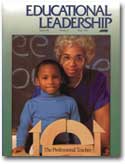Much high praise and a little sharp criticism came our way this month regarding the December 1992/January 1993 issue, “Students at Risk.” While to many readers the theme was “timely,” the treatment “meaty,” and the issue “on target with what's happening in life and in schools,” a few of you told us the subject was “overworked and tired,” “disturbing to read about,” and a concern that educators alone cannot be expected to shoulder. Whether commending or criticizing the issue, though, your remarks were constructive and thoughtful.
An assistant professor wrote “I would have liked more about secondary school students whose apathy, disaffection, and dysfunctional family backgrounds make them at risk. I wanted more about the social and emotional problems of the at-risk, and how schools can help them programmically or with support groups.”
The executive secretary to an assistant superintendent reminded us that “somewhere between the extremes of gifted and at risk is that group of students who somehow must be the bridge if the world is to continue. Maybe a regular feature on bridge maintenance?”
A 4th grade teacher was the only one who rated the issue a 1 (not at all interesting), but she also told us that the “photographic essays were splendid.”
And finally, from a principal: “This was the best issue yet this year. I found solid ideas and reinforcement for why I have stayed in this occasionally crazy field for 14 years.”
Readers had strong reactions to the “Conversation with Jonathan Kozol,” which was judged “favorite article” by the majority:
“We are discussing equity in heated argument now.”
“Kozol keeps pounding away at the truth in spite of the system.”
“The article contains some very controversial statements. A more effective approach might be to present pro and con statements.”
“Jonathan Kozol speaks from the heart and soul of American schools.”
“The Kozol article will be with me for a long time to come.”
“What a dose of reality for those comfortable in the suburbs.”
“Kozol's political and socialist agendas get in the way of reform efforts that could work if he were more level-headed.”
“Kozol is a powerful writer with a simple message: it takes real money to solve problems.”
“Very thought-provoking. Yes, it would be nice to spend $100 billion to build new facilities. However, we all agree it is not likely to happen.”
“Much perturbed by Kozol's beating the drum about total equality in our school system. He makes excellent suggestions, but his view that mucho dollars, properly spent, will cure inner-city doldrums seems a tad noblesse oblige. The article still rates an A.”
“Kozol cares passionately about equality in education. We have deceived ourselves on equity issues because we do so much better than anyone in the world. Yet we have `miles to go.'”
Much appreciated by readers was “Preventing Early School Failures: What Works” by Robert Slavin. It was called “a clear must-read for all in early childhood education,” “a good review on what works and what we're less sure about,” and “a good summary of `touted programs.'”
Finally, a note from writer, Guy Marble, whose “Plea from a Prisoner” seems to have attracted its own Readers' Group:
“The response from around the country caught me totally by surprise. Correspondence from people all across the education field, from perfect strangers who only had nice things to say, materialized as an unexpected source of motivation for my writing.”
Not unexpected by us, Guy. Educators are like that. Thanks, Readers, for the kind words—and motivation to do better.
